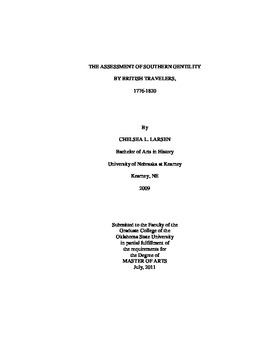| dc.description.abstract | This work examines the degree that gentility existed among the American planter elite between 1776 and 1820. While historians have examined gentility from the American perspective, this work turns to contemporary English commentary, as presented in travelogues. According to the English tradition, there are several ways in which a person expressed gentility. Physical representations came in the form of ownership of refined goods and greatness of house. Inner-virtue also played a role in the determination of a man's gentility. In England, inner-virtue manifested itself through education, refined interactions at social gatherings, participation in gentlemanly sport, and hospitality toward visitors. As a result of the evidence provided by the travelogues, this work looks exclusively at English commentary concerning the American planter culture established Maryland, Virginia, and North and South Carolina. While English travelers of the late-eighteenth and early-nineteenth centuries found evidence of physical representations and inner-virtue in the southern United States, there were other qualifications essential to gentility that the southern planters did not possess. First, where the English gentry possessed an established and stable income, the southern planters were still tied to their plantations as the primary means of their wealth. Responsibilities to the plantation also took time and energy away from a genteel education, practice of refined mannerisms, and attendance at genteel social activities. Second, where refined goods were easier to acquire in England, the wealthiest families in the United States had to import refined goods from England and Europe; this required access to ports and enough money to support the high costs; many families could not meet these demands. Finally, Americans had different priorities than the English gentry; in England, the gentry followed trends and fashions set in Europe as a determination of social status whereas in the United States, gentlemen earned their social status through ownership of property. According to the evidence provided in English travelogues, it was through the lack of these qualifications that the southern planter elite could not be classified as genteel. | |
